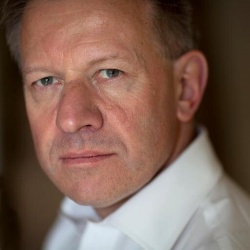Sherard Cowper-Coles

|
This article is part of the Revolving Door project of Spinwatch. |
Sir Sherard Cowper-Coles is a former British diplomat, who has served as ambassador in Saudi Arabia and Afghanistan.
After leaving the foreign office, Cowper-Coles joined arms contractor BAE Systems in 2011 as business development director of its international operating group. He left in 2013.
He was appointed a non-executive director of HSBC Bank Egypt on 1 October 2014. [1]
Contents
Diplomatic career
Cowper-Coles joined the Foreign Office as a desk officer in the Republic of Ireland Department in 1977.[2] He was Third Secretary and later Second Secretary in Cairo, 1980–1983, First Secretary in the Planning Staff of the Foreign and Commonwealth Office, 1983–1985; Private Secretary to the Permanent Under-secretary of State, 1985–1987, First Secretary in Washington, 1987–1991, Assistant in the Security Policy Department of the FCO, 1991–1993, Resident Associate, International Institute for Strategic Studies, 1993–1994; Head of the Hong Kong Department of the FCO, 1994–1997, Political Counsellor in Paris, 1997–1999; Principal Private Secretary to Robin Cook, the Secretary of State for Foreign and Commonwealth Affairs, 1999–2001.
His first role as a head of mission was in Tel Aviv as the British Ambassador to Israel from 2001 to 2003. He was next appointed ambassador to Saudi Arabia in Riyadh, a post that he held until 2006. From May 2007 until 2011 he served as ambassador to Afghanistan in Kabul.
Revolving door
- Business development director, International Operating Group, BAE Systems, February 2011.
ACOBA said, "given that it has been 4 years since he had any involvement with BAE Systems as HM Ambassador to Riyadh, and that the appointment will be 4 months since his last day of service, the appointment was approved subject to the condition that, for 2 years from his last day of service, he should not become personally involved in lobbying UK Government Ministers or Crown servants, including Special Advisers, on behalf of his new employer".[3]
Controversy
The Serious Fraud Office (SFO) had dropped its investigation of BAE Systems, the contractor for Britain’s allegedly corrupt £43 billion arms deal with Saudi Arabia, in December 2006, after intense diplomatic pressure from the Saudis. BAE was fined by US authorities in 2010 after it admitted a relatively minor charge of making false statements but had faced no action in Britain over the Saudi allegations, and until 2011 the full details of the case were kept secret. A US cable given to the WikiLeaks website and obtained by The Daily Telegraph disclosed such details in 2011.
The report revealed that the SFO had evidence that BAE had paid £73 million to a Saudi prince who had 'influence' over the Al-Yamamah defence contract and that there were 'reasonable grounds' to believe another 'very senior Saudi official' received payments. Moreover, BAE had allegedly circumvented anti-bribery laws by making 'substantial payments' to overseas agents employed by the Saudi government
Cowper-Coles' appointment at BAE caused controversy when it was revealed he 'had a profound effect' on the decision by Robert Wardle, then director of the UK's SFO, to end this investigation. Apparently, Mr Wardle had ended the investigation because of a threat that the Saudis would stop providing 'intelligence on al-Qaeda'. Ms Garlick then deputy director of the OECD’s working group on bribery, said three key meetings between Mr Wardle and Sir Sherard “had a profound effect on his views”.[4]
Media management
Robert Fisk writes:
- Indeed, I remember way back in the late 1970s - when I was Middle East correspondent for The Times - how a British diplomat in Cairo tried to persuade me to fire my local "stringer", an Egyptian Coptic woman who also worked as a correspondent for the Associated Press and who provided a competent coverage of the country when I was in Beirut. "She isn't much good," he said, and suggested I hire a young Englishwoman whom he knew and who - so I later heard - had close contacts in the Foreign Office.
- I refused this spooky proposal. Indeed, I told The Times that I thought it was outrageous that a British diplomat should have tried to engineer the sacking of our part-timer in Cairo. The Times's foreign editor agreed.
- But it just shows what diplomats can get up to.
- And the name of that young British diplomat in Cairo back in the late 1970s? Why, Sherard Cowper-Coles, of course.[5]
Connections
- Michael Semple
- Frank Gardner, BBC Security Correspondent
Notes
- ↑ Sherard Cowper-Coles, Bloomberg, date, accesssed date
- ↑ Sir Sherard Cowper-Coles. Cherwell24, 12 October 2007, accessed 28 March 2008.
- ↑ Twelfth Report 2010-2011 Advisory Committee on Business Appointments, accessed 8 December 2014
- ↑ Christopher Hope, Steven Swinford, Revelations in BAE Saudi case prompt inquiry call, The Telegraph, 12 March 2011. Accessed 27 September 2016.
- ↑ 'Abu Henry' and the mysterious silence I guess that's what diplomacy is all about, persuading here, pleading there The Independent, Saturday, 30 June 2007
